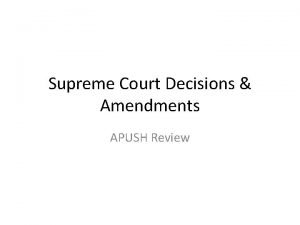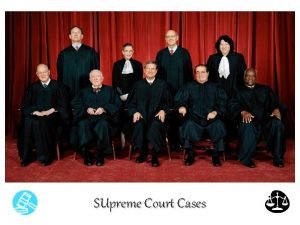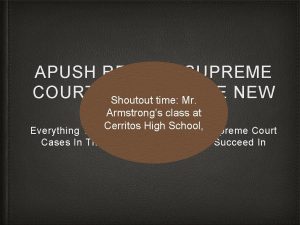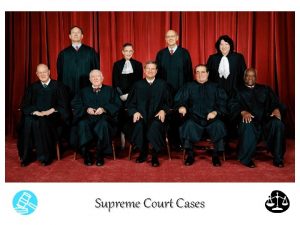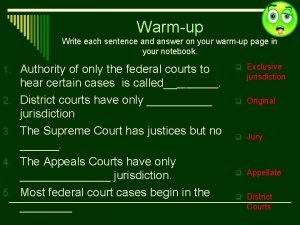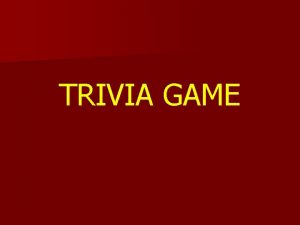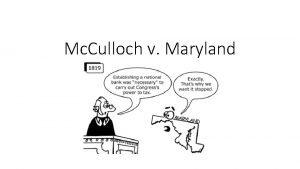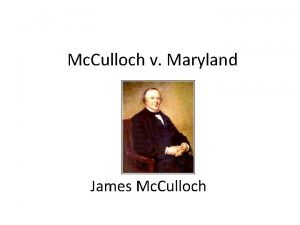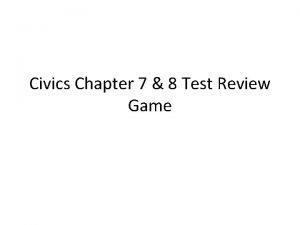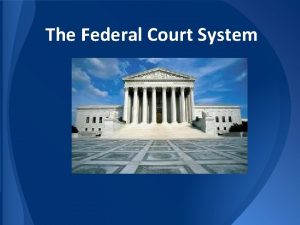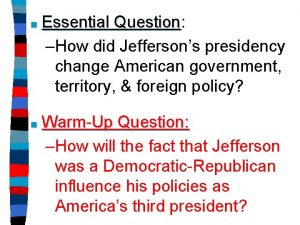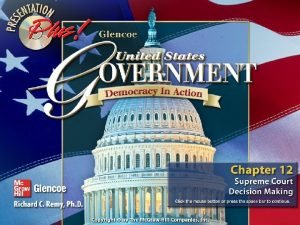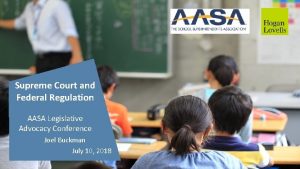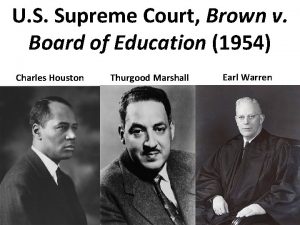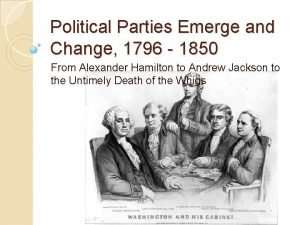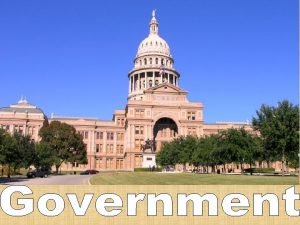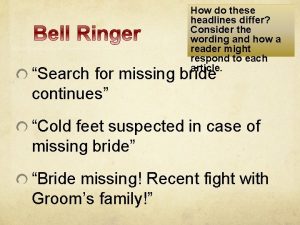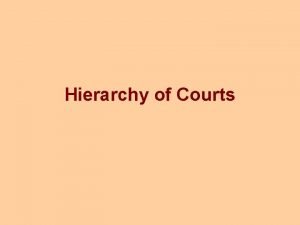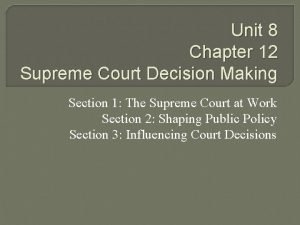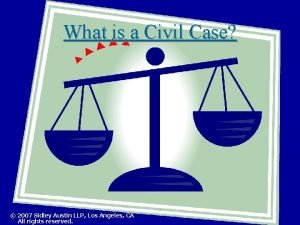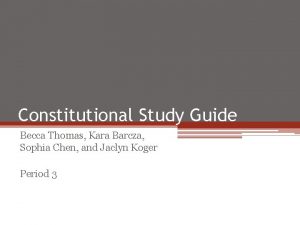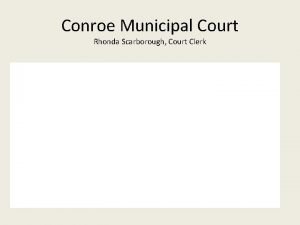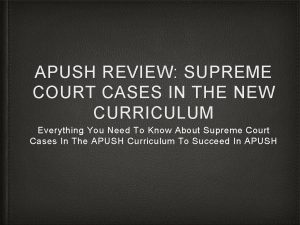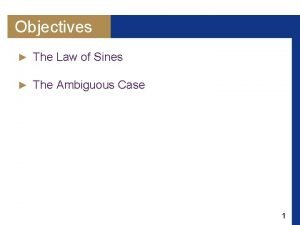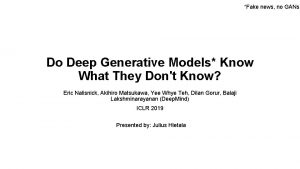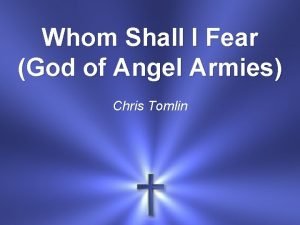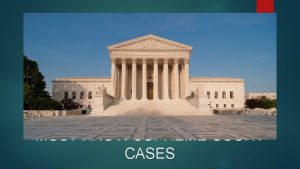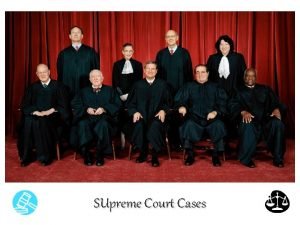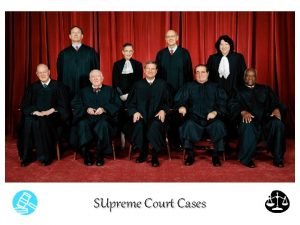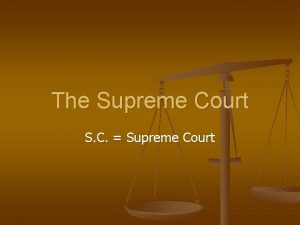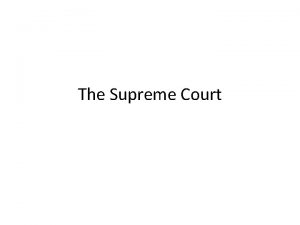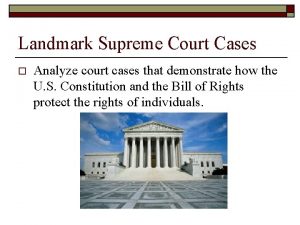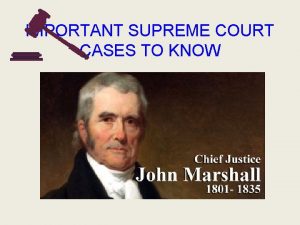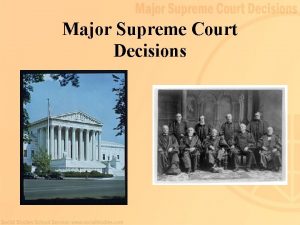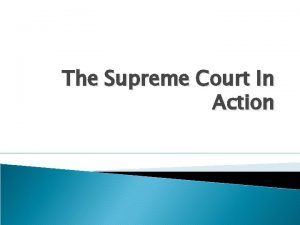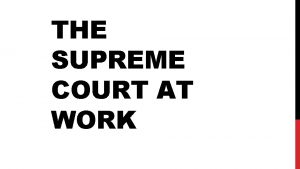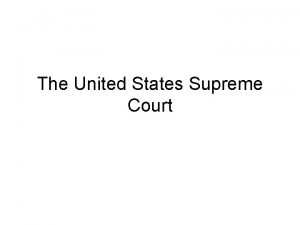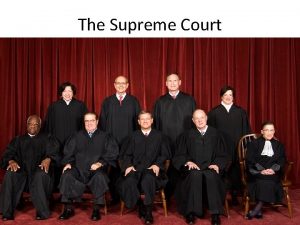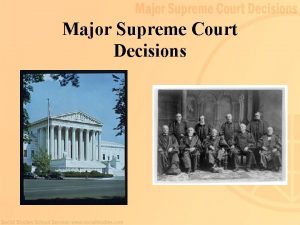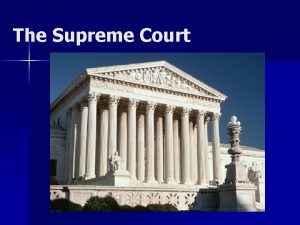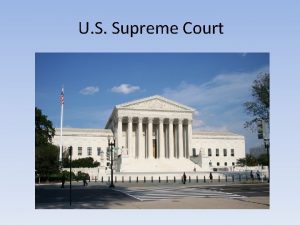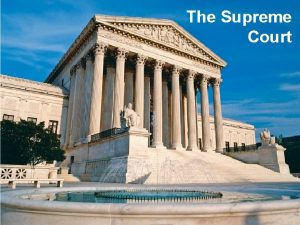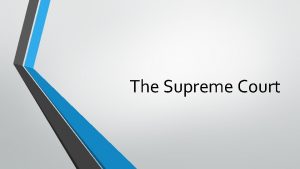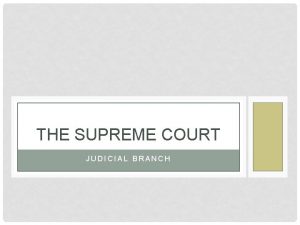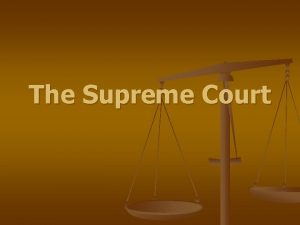MUST KNOW SUPREME COURT CASES Mc Culloch v





























- Slides: 29

MUST KNOW SUPREME COURT CASES

Mc. Culloch v. Maryland (1819) Question: Can Congress charter a National Bank? Can the states tax the National Bank? Decision: Established the presence of implied powers separate from enumerated powers by using “Necessary & Proper Clause” Marshall wrote that "the Constitution and the laws made in pursuance thereof are supreme. . . they control the Constitution and laws of the respective states, and cannot be controlled by them. "

Gibbons v. Ogden(1824) Question: Did the State of New York exercise authority in a realm reserved exclusively to Congress? Decision: Further expanded Supremacy Clause Commerce Clause! Only Congress has the “power to regulate interstate commerce”

Dred Scott v. Sandford(1857) Question: Was Dred Scott free or a slave? Decision: Slaves lacked citizenship and could therefore not sue Congress lacked authority to forbid slavery in territories

Plessy v. Ferguson(1896) Question: Is Louisiana's law mandating racial segregation on its trains an unconstitutional infringement on both the privileges and immunities and the equal protection clauses of the Fourteenth Amendment? Decision: Legitimized segregation Established principle of “Separate but equal”

Schenck v. United States(1919) Question: Was Schenck’s actions encouraging his supporters not to submit to conscription Decision: Free speech could be limited in cases where there is a “clear and present danger” to national security Speech can be regulated greater during times of war

Gitlow v. New York (1925) Question: Is the New York law punishing advocacy to overthrow the government by force a violation of the First Amendment? Decision: Used due process clause of 14 th amendment to incorporate rights of free speech at the state level

Korematsu v. United States (1944) Question: Did the President and Congress go beyond their war powers in restricting the rights of Americans of Japanese descent? Decision: Need to protect the United States from spying and other wartime acts more important than individual rights. Gov’t has right to exclude and forcibly remove people based on their race in times of war

Brown v. Board of Education (1954) Question: Does the segregation of public education based solely on race violate the Equal Protection Clause of the Fourteenth Amendment? Decision: “Separate but equal” facilities are inherently unequal Violation of Equal Protection Clause of the 14 th Amendment. Segregation of public education based on race instilled a sense of inferiority that had a hugely detrimental effect on the education of African American children.

Baker v. Carr (1961) Question: Did the Supreme Court have jurisdiction over questions of legislative apportionment? Decision: Established precedent that when equal protection is denied it is a justiciable dispute and courts can rule

Mapp v. Ohio (1961) Question: May evidence obtained through a search in violation of the Fourth Amendment be admitted in a state criminal proceeding? Decision: Incorporated 4 th amendment protection at the state level Illegally obtained evidence is not admissable in court

Engel v. Vitale (1962) Question: Does the reading of a nondenominational prayer at the start of the school day violate the "establishment of religion" clause of the First Amendment? Decision: By providing prayer, State of New York was officially endorsing religion Strengthened Establishment Clause as way to remove religion from government activity

Gideon v. Wainwright (1963) Question: Does the Sixth Amendment's right to counsel in criminal cases extend to felony defendants in state courts? Decision: Incorporated right to free counsel in felony cases at the state level

Griswold v. Connecticut (1965) Question: Does the Constitution protect the right of privacy against restrictions on a couple's ability to be counseled in use of contraceptives? Decision: The First, Third, Fourth, and Ninth Amendments, when read together, create a new constitutional right to privacy

Miranda v. Arizona (1966) Question: Do the Fifth Amendment’s protection against selfincrimination extend to the police interrogation of a suspect? Decision: Held that the 5 th Amendment’s protection against self -incrimination is available in all settings. Prosecution may not use statements arising from interrogation of a suspect unless there is proof that the suspect was aware of his right to be silent, that any statement he makes may be used against him, that he has the right to have an attorney present, that he has the right to have an attorney appointed to him, that he may waive these rights if he does so voluntarily, and that if at any points he requests an attorney there will be no further questioning until the attorney arrives.

Tinker v. Des Moines I. S. D. (1969) Question: Does a prohibition against the wearing of armbands in public school, as a form of symbolic protest, violate the students' freedom of speech protections guaranteed by the First Amendment? Decision: Armbands and symbols represent speech. Students did not lose their First Amendment rights to freedom of speech when they stepped onto school property. In order to justify the suppression of speech, the school officials must prove that conduct would "materially and substantially interfere" with the operation of the school

Lemon v. Kurtzman (1971) Question: Can a state government issue funds to religious institutions such as a non-public religious school? Decision: Found that the passing of any state laws that establish a religious body is a direct violation of the 1 st Amendment & the Establishment Clause Restricts application of public tax dollars to fund religious schools

New York Times Co. v. United States (1971) Question: Did the Nixon administration's efforts to prevent the publication of what it termed "classified information" violate the First Amendment? Decision: Prior restraint of 1 st Amendment rights can not occur unless the government establishes that release of information will lead to an “inevitable, direct, and immediate event imperiling the safety of American forces”

Wisconsin v. Yoder (1972) Question: Did Wisconsin's requirement that all parents send their children to school at least until age 16 violate the First Amendment by criminalizing the conduct of parents who refused to send their children to school for religious reasons? Decision: People’s rights to the 1 st amendment’s Free Exercise Clause outweigh the State's interests in requiring school attendance beyond the eighth grade Established three-part test to assess Free Exercise limits: First, are the religious beliefs in question sincerely held? Second, is the law seriously burdening those beliefs? If yes on first two, the Courts must balance the state's interests against the free exercise interests of citizens.

Roe v. Wade (1973) Question: Does the Constitution embrace a woman's right to terminate her pregnancy by abortion? Decision: A woman's right to an abortion fell within the right to privacy previously established in Griswold v. Connecticut Gave a woman total autonomy over the pregnancy during the first trimester and established limits by which states could establish limits durin gthe second and third trimesters.

Buckley v. Valeo (1976) Question: Did the limits placed on election/campaign spending by the Federal Election Campaign Act, violate the First Amendment's freedom of speech and association clauses? Decision: Restrictions on individual contributions to political campaigns and candidates did NOT violate the First Amendment since these limitations were to enhance the "integrity of our system of representative democracy" by guarding against corrupt practices. Restriction of independent expenditures in campaigns, limiting expenditures by candidates from their own personal or family resources, and the limiting of total campaign expenditures DID violate the First Amendment

California Regents v. Bakke (1978) Question: Did the University of California violate the Fourteenth Amendment's equal protection clause, and the Civil Rights Act of 1964, by practicing an affirmative action policy that resulted in the repeated rejection of Bakke's application for admission to its medical school? Decision: A university's use of racial "quotas" in its admissions process was unconstitutional under the equal protection clause of the 14 th amendment BUT a school's use of "affirmative action" to accept more minority applicants was constitutional in some circumstances.

Planned Parenthood of SE Pennsylvania v. Casey (1991) Question: Can a state require women who want an abortion to obtain informed consent, wait 24 hours, and, if minors, obtain parental consent, without violating their right to abortions as guaranteed by Roe v. Wade? Decision: Established the new standard to determined where state laws restricting abortion are constitutional. Standard: Does the regulation have the purpose or effect of imposing a "substantial obstacle in the path of a woman seeking an abortion before the fetus attains viability? " Under this standard, the only provision to fail the undueburden test was the husband notification requirement.

Shaw v. Reno (1993) Question: Did the North Carolina residents' claim, that the State created a racially gerrymandered district, raise a valid constitutional issue under the Fourteenth Amendment's Equal Protection Clause? Decision: Although it was a legitimate goal for state legislatures to take race into account when they draw electoral districts in order to increase the voting strength of minorities, they may not make race the sole reason for drawing district lines.

United States v. Lopez (1995) Question: Does the 1990 Gun-Free School Zones Act, forbidding individuals from knowingly carrying a gun in a school zone, exceeds the power of Congress to legislate under the Commerce Clause? Decision: Established limits on the Commerce Clause and set a precedent that Congressional regulation through Commerce Clause can only occur when an economic activity, through repetition elsewhere, has a substantial effect on interstate commerce

United States v. Morrison (2000) Question: Does Congress have the authority to enact the Violence Against Women Act of 1994 under either the Commerce Clause or Fourteenth Amendment? Decision: Further limited Congress’s authority under the Commerce Clause Stated Congress lacked the authority to enact a statute under the Commerce Clause or the Fourteenth Amendment since the statute did not regulate an activity that substantially affected interstate commerce nor did it redress harm caused by the state.

Bush v. Gore (2000) Question: Could the Florida Supreme Court order a manual recount of all “problem ballots” or did their order violate Article II Section 1 Clause 2 of the U. S. Constitution by making new election law? Do standardless manual recounts violate the Equal Protection and Due Process Clauses of the Constitution? Decision: The Equal Protection clause guarantees individuals that their ballots cannot be devalued by "later arbitrary and disparate treatment, " so the Florida Supreme Court's scheme for recounting ballots was unconstitutional. Even if the recount was fair in theory, it was unfair in practice. The record suggested that different standards were applied from ballot to ballot, precinct to precinct, and county to county.

Citizens United v. Federal Election Commission (2010) Question: Do the BCRA's (Mc. Cain-Fiengold) disclosure requirements impose an unconstitutional burden when applied to electioneering requirements because they are protected "political speech" and not subject to regulation as "campaign speech"? If a communication lacks a clear plea to vote for or against a particular candidate, is it subject to regulation under the BCRA? Decision: The First Amendment corporate funding of INDEPENDENT political broadcasts in candidate elections cannot be limited. Political speech is no less protected because the speech comes from a corporation.

Mc. Donald v. Chicago (2010) Question: Does the Second Amendment apply to the states because it is incorporated by the Fourteenth Amendment's Privileges and Immunities or Due Process clauses and thereby made applicable to the states? Decision: The Fourteenth Amendment makes the Second Amendment right to keep and bear arms for the purpose of self-defense applicable to the states. Fully incorporated second amendment to all states
 Important amendments apush
Important amendments apush Insular cases apush
Insular cases apush Important court cases apush
Important court cases apush Cohens vs virginia apush
Cohens vs virginia apush How cases reach the supreme court worksheet answers
How cases reach the supreme court worksheet answers Is there a basketball court above the supreme court
Is there a basketball court above the supreme court Mc culloch v maryland
Mc culloch v maryland Mc culloch v maryland
Mc culloch v maryland The u.s. supreme court works chiefly as a(n)
The u.s. supreme court works chiefly as a(n) Supreme court
Supreme court Us circuit court map
Us circuit court map John marshall supreme court
John marshall supreme court Supreme court does
Supreme court does Supreme court does
Supreme court does Supreme court
Supreme court The supreme court change
The supreme court change Have supreme court
Have supreme court What do these headlines say about how the supreme court
What do these headlines say about how the supreme court Which of these best summarizes the monroe doctrine?
Which of these best summarizes the monroe doctrine? Jurisdiction of supreme court
Jurisdiction of supreme court Victorian court hierarchy
Victorian court hierarchy Vocabulary activity 12 supreme court decision making
Vocabulary activity 12 supreme court decision making John marshall supreme court
John marshall supreme court Criminal cases vs civil cases
Criminal cases vs civil cases 3rd amendment court cases
3rd amendment court cases Scarborough court cases
Scarborough court cases Important court cases apush
Important court cases apush How to solve ambiguous case triangles
How to solve ambiguous case triangles Normalizing flow
Normalizing flow Nothing formed against me shall stand
Nothing formed against me shall stand
